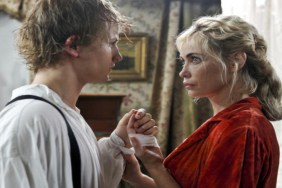Gérard Jugnot as Clément Mathieu
François Berléand as Rachin
Jean-Baptiste Maunier as Pierre Morhange enfant
Jacques Perrin as Pierre Morhange adulte
Kad Merad as Chabert
Marie Bunel as Violette Morhange
Philippe Du Janerand as Langlois
Jean-Paul Bonnaire as Maxence
Maxence Perrin as Pépinot enfant
Didier Flamand as Pépinot adulte
Grégory Gatignol as Mondain
Cyril Bernicot as Le Querrec
Carole Weiss as La comtesse
Paul Chariéras as Régent
Thomas Blumenthal as Corbin
Summary:
Despite being formulaic and somewhat predictable, the charm of the characters and story in Christophe Barratier’s The Chorus wins out in the end, even if it feels like you’ve seen it before.
Story:
Failed musician Clement Mathieu (Gerard Jugnot) comes to a strict boys’ boarding school, where the tough headmaster Racine (Francois Berleand) rules over the delinquent youth with his motto of “Action-Reaction.” Mr. Mathieu tries a different approach, introducing music into their lives, forming a boys’ choir that allows the teacher to discover the secret musical talents of a quiet but troubled young boy, not to mention his beautiful single mother.
Analysis:
Sure, the story of a new teacher trying to get through to difficult students and trying to help improve their lives is nothing new, and the plot for The Chorus may immediately remind some of the Richard Dreyfus film Mr. Holland’s Opus. But this isn’t a ripoff, as much as a remake of a French film from 1945 called La Cage aux Rossignols (translated as “The Cage of Nightingales”) While The Chorus rarely breaks away from the formula of the academic drama genre, you can’t really hold it against director Christophe Barratier, who creates a rich and entertaining story that shows why this type of movie continues to be popular.
Set in 1949, Barratier’s milieu is “Fond de L’Etang” or “Rock Bottom”, a boarding school for wayward boys to which arrives the mild-mannered Mr. Matthieu, a middle-aged loser who never quite found his way as a musician. He’s taken aback by the way that the headmaster rules over the boys with an unflinching iron fist, but he’s also slightly scared by the amount of violent pranks played on the staff that he sees firsthand. Most of these kids have gone through a lot, having lost fathers or parents during World War II, so Mathieu tries to empathize with them and find some middle ground with the worst of the troublemakers. Instead of punishing or reporting them to the headmaster, Mathieu tries a combination of hard words and understanding. When that doesn’t work, he has a brainstorm to form a makeshift choir, in hopes that he can teach them discipline by having them sing his self-penned songs about their surroundings. Of course, the headmaster is completely against the idea, and after the school’s coffers are robbed, he outright bans the choir from practicing in the school.
The central plot revolves around the handsome young boy Pierre Morhange, whose single mother puts him into the school to keep him out of trouble. He’s clearly having problems dealing with the loss of his father, something made worse when his new teacher becomes smitten with his mother, creating a strange dynamic between the three of them. All preconceptions of how this storyline will play out should be put aside, because it offers some of the film’s most touching and thoughtful moments.
With a genre like this one, there are always going to be the usual stereotype characters from the teachers that back the headmasters’ methods to the different types of problem students. Most of those are found here, including the obligatory youngster, who is always picked-upon by the older students until the new teacher steps in. The film follows a pretty standard flow of the story with all the usual peaks, but there are a few nice twists, such as the arrival of a teen sociopath, who disrupts Mathieu’s progress and causes waves within the school.
What makes this film rise above the typical Hollywood films of this nature is the way Barratier pulls together this terrific ensemble cast. First and foremost are performances from two veteran French actors with hundreds of films under their belts, despite being virtually unknown in the States. Gerard Jugnot does a great job making Mathieu a generally likeable role model for the boys, allowing the audience to empathize with him when things don’t go the way expected, and Francois Berleand is equally good as his polar opposite, the tough headmaster Rachin. It should be no surprise that the film’s climax is the final face-off between the two of them.
All of the child actors are impressive, but the film’s most pleasant surprise is thirteen-year old Jean-Baptiste Maunier, who gives a rich emotional performance as the troubled Morhange who Matthieu tries to take under his wing. It’s an impressive debut that shows great potential both as a singer and an actor.
The involvement of actor/filmmaker Jacques Perrin (Winged Migration) is evident from the first frame as Perrin plays the older Morhange, a conductor in present day who looks back at his formative days at the school. Perrin brought on board his frequent collaborator, composer Bruno Coulais, whose sultry score of lush orchestrations and chorale work brings so much to the film.
The Bottom Line:
Although The Chorus has much in common with previous academic dramas about teachers trying to make a difference, the film’s setting and its unique sensibilities makes it a rather quaint and enjoyable experience all its own.
The Chorus opens in New York and Los Angeles on Friday, and expands to other cities later in January.









